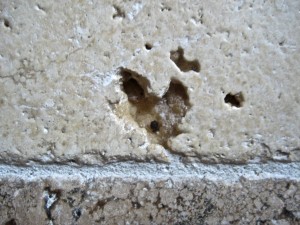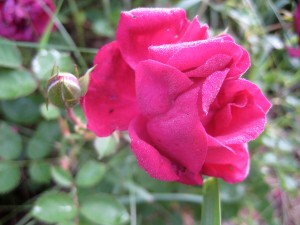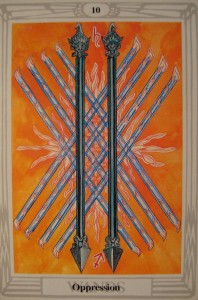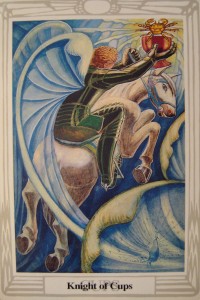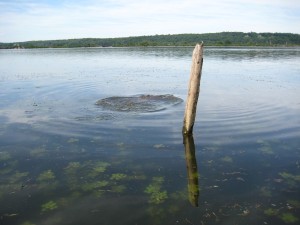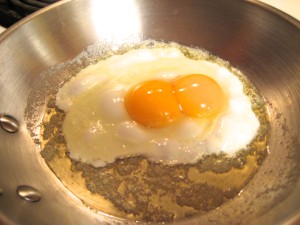
– Photo by Jan Ketchel
Obsessive Compulsive Disorder can be viewed as the psyche’s attempt to achieve its wholeness through the ego’s encounter with its projections upon the outside world. On the surface this might appear contradictory to the debilitating impact of obsessions and compulsions, but a deeper understanding of the psyche’s drive for perfection, through the challenge of sorting through this disorder, may serve to redirect the focus of these powerful debilitations toward the far greater opus of achieving wholeness.
Carl Jung spent much of his professional career rescuing the archaic texts of alchemy from obscurity and through channeling alchemical information from the Akashic Records through various alchemical characters of his active imagination. Many astute clinical scholars have been utterly perplexed at the clinical usefulness of these musings. Jung never cared much for making his discoveries easily understood; he was an avid explorer of the unconscious who left for the future the task of discerning their pragmatic utility. Hardly a scholar, I find myself nonetheless tasked with making some of his discoveries relevant. And so, with OCD I find incredible alchemical relevancy.
Alchemy was, in an outer sense, the precursor of modern chemistry. But at its inner core, alchemy was the mystical tradition of many renowned scientists—Sir Isaac Newton among them—who sought to experience and resolve the mysteries of the soul. The opus of the alchemist was to take matter and transform it through a series of processes into gold, the symbol of ultimate value. These processes involved the differentiation, purification and synthesis of opposing elements into a cohesive whole. Similarly, the goal of human life is to reconcile the great polarities of living in this world with the energetic dimension beyond this world to achieve a golden wholeness of completion.
The alchemist started with matter in all its impurities—called the nigredo—that is, matter in its completely contaminated, mixed up state. It was then subjected to a series of alchemical operations to reach the full purity of gold. These purification processes included such functions as solutio, the dissolution of matter in water, as well as calcificatio, the burning off of impurities by fire. Jung saw these steps in the process as the alchemist’s projection of their own psyches onto the matter, and their ultimate art as a process of transformation. Transformation requires a sealed container where these operations can be securely housed.
In OCD, the psyche frequently projects the impurity of its internal polarities onto the contents of the material world. This intermingling is analogous to the mixing of the contaminated material at the beginning of the alchemist’s opus. In OCD, powerful compulsions elicit behaviors to separate out this contamination through ritual practices. An individual under the influence of these powerful projections is tormented by the potential danger of contamination and frequently engages the alchemical function of solutio—excessive hand washing, for instance—to rid the self of the impurities of contamination. Eventually, these unconscious projections inundate and ultimately overwhelm and severely restrict even the simplest of functions in daily life.
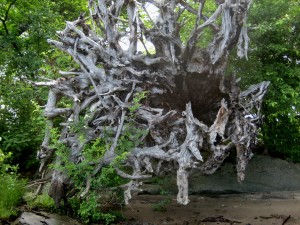
– Photo by Jan Ketchel
The opus for OCD treatment becomes one of detaching from the control of, and the automatic infliction of, the projections onto the outer world. The ego cannot control the projections, but it can take a behavioral stand against the compulsions that issue forth from the unconscious. Thus, although an obsession insists that “I’m contaminated” after a handshake, I can refuse to do the cleansing behavior that the compulsion insists upon as a means of relief. The true cleansing, the true purification process rests here, in the ego’s stand for reality over the projective veils of illusion. Here the ego acts as the sealed container for the alchemical process by bearing the tension of the urges of the projective psyche through not following its commands.
In its contained retort, the ego seals in the energy of the projective psyche and bears the mounting tension of its energetic pressure. This mounting pressure, seeking release, is the fire that then burns through the veils of the projective illusions. The substance is clarified and true reality is readied for synthesis into gold. The ego, thus having passed its test, accrues a piece of its lost wholeness. The Opus of OCD meanwhile moves on to its next mysterious projective challenge.
Eventually, the energies of the psyche transform OCD itself into a fact of a former life, no longer an energetic determinant. When that happens, the clarified energetic awareness thus achieved moves forward, freed to see and be in the world as it truly is.
Everything matters,
Chuck


